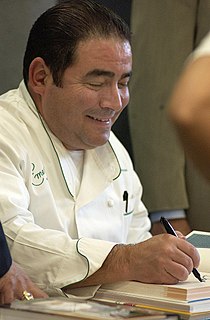A Quote by Anna Getty
I'm super supportive of locally grown foods and farmers. Here in L.A., I know all of my farmers markets and go there weekly.
Related Quotes
SNAP benefits help local economies because the benefits are spent at local grocery stores - with locally grown and locally-made products. I remember many years ago, while on food stamps, I advocated for the benefits to be spent at local farmers markets - a move that has helped local economies even more.
You do need some dispensation for local farmers, because the fast food industry will promote the unsanitary conditions of farming. With vegetables, you have to be careful where they come from; you have to know the farmers and trust them. If you buy from the farmers' market, it's already been investigated.
The traditional farm, the peanuts, the cotton, the corn, is probably not the thing to do, because you're up against big farmers who can afford all the equipment to grow those kinds of crops. But we need healthy food. We're being encouraged to eat more vegetables. Our school systems are being encouraged to buy locally. So, we need farmers who can produce that food.
Often, farmers have difficulty finding secondary markets for their outgrades and have no choice but to leave fresh produce unharvested to rot in the field. Gleaning Network U.K. coordinates teams of volunteers with willing farmers across the U.K. to direct this fresh surplus produce to charities that redistribute it to people that need it most.
A decade ago, critics suggested biotech crops would not be valuable in the developing world. Now 90 percent of farmers who benefit are resource-poor farmers in developing countries. These helped alleviate 7.7 million subsistence farmers in China, India, South Africa, the Philippines from abject poverty.
Previous generations used to eat locally out of necessity. Without options like flash-freezing and worldwide export services, communities had to rely on local farms for all of their meals. In many ways, this was beneficial. People ate fresh, seasonal foods that were naturally flavorful and nutritious, and farmers and communities prospered.




































